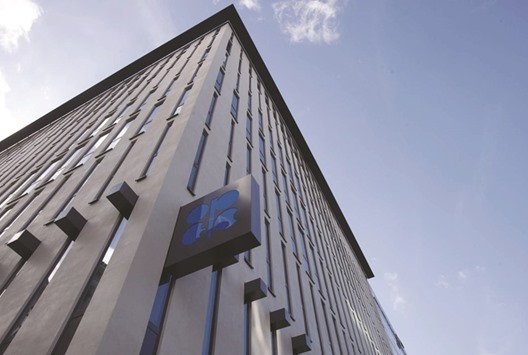Opec said the global oil market is oversupplied and signalled the glut may increase this year, as surging output from its members makes up for losses from other countries whose production has been hit by a price fall.
Supply from the Organisation of the Petroleum Exporting Countries (Opec) is climbing after sanctions on Iran were lifted and an initiative with Russia and other non-members to tackle a supply glut by freezing output failed last month.
Opec pumped 32.44mn barrels per day (bpd) in April, the group said in a monthly report citing secondary sources, up 188,000 bpd from March. This is the highest since at least 2008, according to a Reuters review of past Opec reports.
“Fundamentally, oversupply still persists,” Opec said in the report published yesterday. “Oil output remains high.”
A persistent surplus could weigh on prices, which despite a recovery to $47 a barrel from a 12-year low of $27.10 in January, are less than half their level in mid-2014. Opec’s 2014 strategy shift to defend market share against higher-cost rival output helped deepen the decline.
The price drop is hitting non-Opec supply as companies have delayed or cancelled projects around the world. Opec forecasts supply from outside producers will decline by 740,000 bpd in 2016 led by the US, little changed from last month.
Opec cited factors that could lead to a bigger supply drop, such as the impact of wildfires in Canada that have cut production. The evidence of falling non-Opec supply should lead to a stronger market next year, it said.
“Outside the US, there have been consistent signs of declines in non-Opec production, which should likely flip the global oil market into a net deficit in 2017.”
But Opec supply has been climbing since the 2014 policy shift led by top two producers Saudi Arabia and Iraq. The return in December 2015 of Indonesia as an Opec member has also increased total output.
So far this year, Iran is driving the growth. Tehran had refused to join the supply freeze initiative and the deal fell apart on April 17 in Doha after Saudi Arabia insisted Iran took part.
Opec left its forecast that world oil demand will rise by 1.20mn bpd this year unchanged. It sees demand for Opec crude averaging 31.49mn bpd in 2016, broadly unchanged from last month’s forecast.
The report points to a 950,000-bpd surplus on average in 2016 if Opec keeps pumping at April’s rate, up from 790,000 bpd implied in last month’s report.
Oil prices slipped yesterday, ending a three-day rally as a strong dollar weighed and investors cashed in on recent gains, but losses were cushioned by outages in Nigeria that have slashed output to the lowest in over two decades.
Brent crude futures were down 26¢ at $47.82 a barrel by 1:22 p.m. ET (1722 GMT). US crude fell 50¢ to $46.20.
Prices recovered slightly as US oil production looked set to continue its decline after drillers cut rigs for an eighth straight week to the fewest since October 2009, oil services company Baker Hughes said.
“The market sentiment remains biased to the upside, supported by a growing view that the global oil complex is already in a rebalancing pattern,” said Dominick Chirichella, senior partner at the Energy Management Institute in New York.
The markets were boosted earlier after Exxon Mobil Corp declared force majeure on exports of Nigeria’s largest crude grade as a portion of production had been curtailed following damage to a pipeline by a drilling rig.
Output from Africa’s largest oil producer has fallen to 1.65mn barrels per day (bpd) due to militant attacks, Finance Minister Kemi Adeosun said, from 2.2mn bpd.
Petromatrix oil analyst Olivier Jakob said Nigerian production was unlikely to be much above 1mn bpd, excluding condensates. “We expected more supply disruptions out of Nigeria this week but the pace of new supply problems from that country beats our expectations,” he said.
Unplanned oil supply outages have risen this month to the highest in at least five years because of wildfires in Canada and further losses in Nigeria and Libya.
The Canadian wildfires forced the closure of oil sands facilities and declarations of force majeure from at least four major oil firms.
The oil market has been rocked by chronic oversupply in recent years, badly hurting producers but translating into lower prices at the petrol pumps for consumers.
Despite the week’s gains, the market remains far below the $100-a-barrel mark of mid-2014 — and sank underneath $30 earlier this year on the back of abundant supplies.
Signs that supplies are coming down won further support this week from data showing that Nigeria’s oil output had slumped to a 22-year low because of pipeline sabotage and increasing unrest that has seen major companies evacuate staff.

Opec pumped 32.44mn barrels per day (bpd) in April, the group said in a monthly report, citing secondary sources, up 188,000 bpd from March. This is the highest since at least 2008, according to a Reuters review of past Opec reports.
